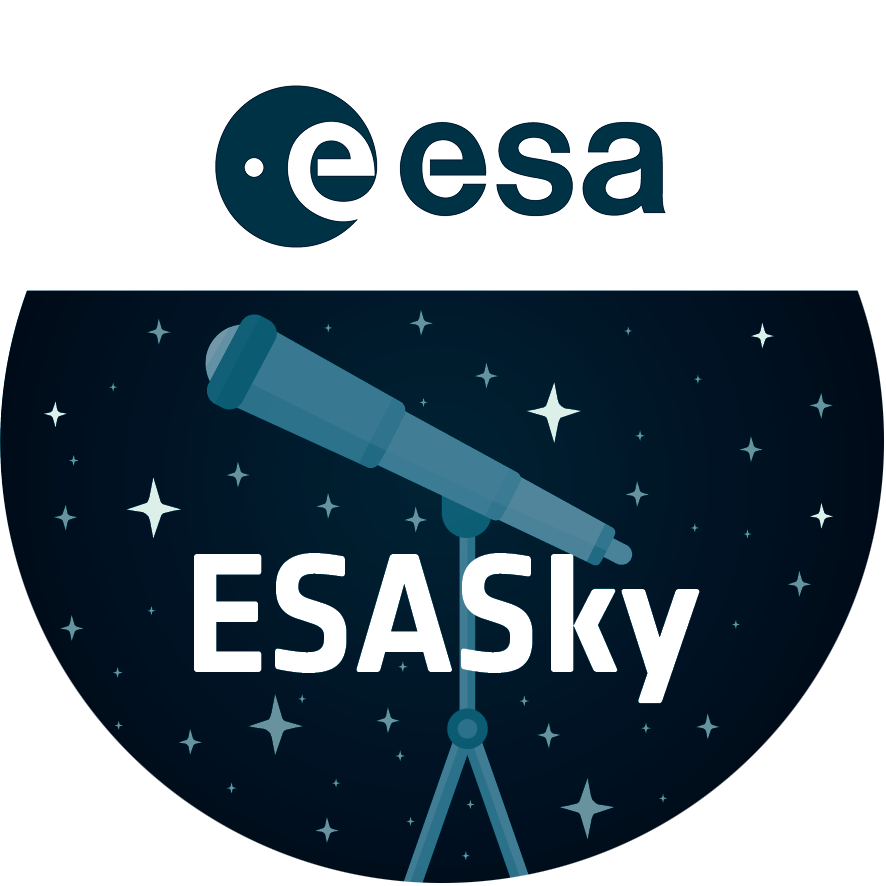ESASky User Forum / Whiteboard
Welcome to the ESASky user forum! The aim of this forum is to have a place to collect feature requests from users, allow conversations between users and gauge the Astronomy community's priorities related to the ESASky application. We welcome requests for the ESASky, its documentation, its ways of interacting with the community, and any functionality which you think would be widely useful to the Astronomy community.
Please suggest and vote on feature requests below. Before adding a new suggestion, use the search function to see if the idea has already been posted. Please include links to relevant repositories and existing issues in the description of the feature request. Also consider including links to code or images demonstrating the requested functionality.
You can also use this forum to report bugs or request small improvements to existing functionality.
Other places to get help and communicate with the ESASky team are:
- @ESAESDC on Twitter
- The ESASky newsletter
- The team's info email address (esaskyinfo at sciops.esa.int)
- The ESASky helpdesk (requires registration)
The ESASky Project is dedicated to maintaining a positive, inclusive, successful, and growing community. Please observe the usual basic internet citizen rules before posting to this forum.

 Measurement Tool
Measurement Tool
This is another good useful resource (found in the ArXiv listing today.)
What would be very useful is a measurement tool giving separation in arcsec and position angle in degrees, whose accuracy would be in the order of 0.01 arcsec and 0.01 degrees. This could be used to estimate distances or sizes of unknown objects or stars between any two points, and would be useful in some double star work when looking at GAIA data for distant companion stars. This tool is similar to that already available in CDS Aladin, tweaking only the precision displayed.

 Suggestion for ESASky: direct images of exoplanets and circumstellar disks
Suggestion for ESASky: direct images of exoplanets and circumstellar disks
Hello ESASky team,
I like the idea behind ESASky. Could I possibly make a suggestion, if you don't mind? I think it would be really useful and fun/educational if we could zoom into direct images of exoplanets and exoplanetary disks that have already been taken by ESO and NOIRLab. For example, zooming into the beta pictoris system and getting to see an image of the exoplanet beta pictoris B as it had been captured by NOIRLab or ESO's instruments. And perhaps have the ability to crossfade the direct images of such exoplanets and exoplanetary disks against the background all-sky map, etc.
Could the ESASky team please consider such additional features for future versions?
Best regards,
Nadia

 Allow coordinate grid overlay
Allow coordinate grid overlay
Another suggestion from the teachers' workshop, which had already come up in previous conversations with colleagues: The possibility to overlay a coordinate grid for easier coordinate identification and (maybe) quick distance estimates.

Dear Fabrizio,
It is our great pleasure to announce to you that ESASky v2.0 has been released today and that it now runs on mobile devices like smartphones and tables. It is ironic to have to tell you this since YOU HAVE MADE IT yourself!!
So thanks so much and congratulations for the good work!!
Bruno Merín
On behalf of the ESAC Science Data Centre

 Allow the integration of ESASky in a jupyter notebook
Allow the integration of ESASky in a jupyter notebook
It would be great to be able to instantiate ESASky in a window inside a jupyter or jupyter lab notebook such that users can inspect data on it, make modification to either images, spectra or catalogues and plot things in real time in ESASky.
Here you can find a similar functionality already available for Aladin Lite: https://github.com/cds-astro/ipyaladin

 Allow to search for Solar System Objects observed serendipitously by Astronomy missions
Allow to search for Solar System Objects observed serendipitously by Astronomy missions
I would like to be able to search for Solar System Objects that might have been serendipitously (or intentionally) observed by Astronomy observatories.

Dear Bruno,
As you know, version 2.0 of ESASky has just been released at http://sky.esa.int and allows to search so far for planets and comets that have been observed either intentionally or serendipitously by space astronomy missions.
Best regards,
Bruno
On behalf of the ESAC Science Data Centre

 I would like to get footprint of PACS observations only, without SPIRE, is that possible ? - Bruno Altieri
I would like to get footprint of PACS observations only, without SPIRE, is that possible ? - Bruno Altieri

Dear Bruno,
We are happy to report that the feature you requested is now available in ESASky v2.0: http://sky.esa.int
Just click on the filter icon at the top of the INSTRUMENT column in a Herschel imaging tab and you will be able to select the instrument you want.
Enjoy!
Bruno2

 Generic EPIC FOV for observations planning
Generic EPIC FOV for observations planning
It would be very useful to have an XMM observation planning tool overlaping a field with a generic EPIC footprint for a given RA, Dec and Position Angle. Aladin has this tool wrong, placing RA, Dec in the PN gaps intersection...

 allow to create PNG thumbnails for a target list
allow to create PNG thumbnails for a target list
I would like to have a feature in ESASky to create thumbnails on any specified wavelength (by default optical DSS color but possible other too) with a target list.
If possible, I would like to be able to do it also from the python API of ESASky.

 Dynamic overlay symbols for catalogued data
Dynamic overlay symbols for catalogued data
If EsaSky allows to overlay any Vizier or ESDC catalogue by indicating source positions then it would be very useful if symbols can be adapted to catalogued parameter values.
The user shall be able to select an observable like photometry, photometric error, size, shape parameter, ellipticities etc. from the catalogue for which the system auto-scale symbol size and/or symbol colour. This way a single observable parameter could be easily visualised besides the source position. The system shall auto-detect applicable ranges for the area visualised, or the user shall be able to select a range of values on which the symbol size/colour is applied irrespective the area of interest.
This feature shall be generalised to any derived parameter applying simple arithmetics. For instance, symbol size shall be adapted to a range of Parameter_A, where Parameter_A = Column_1+(Column_2/Column_4).
This functionality facilitates decision support for scientist who could benefit of easy and quick visualisation of large databases for taxonomical research, finding spatial correlations of objects with certain observational properties, finding spatial correlations between type of objects and background structure etc.
Customer support service by UserEcho





